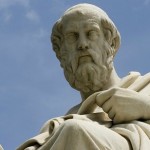We run our website the way we wished the whole internet worked: we provide high quality original content with no ads. We are funded solely by your direct support. Please consider supporting this project.

What Makes the Good News So Good
While God was revealed in various ways and to various degrees through the law and the prophets of the Old Testament, in Jesus we finally have the one who is “the exact representation of God’s being” or essence (hypostasis, Heb. 1:1-13). This is the heart of the Good News that reverberates throughout the New Testament. God looks like Jesus. To see Jesus is to see the Father (Jn. 14:7-9). This is why followers of Jesus can never just accept a generic understanding of the word “God,” as though the meaning of this word is self-evident.
What makes this Good News good, however, is not merely that Jesus is the definitive revelation of God: it’s rather the beautiful character of the God that Jesus reveals. This character is succinctly, and famously, captured by John when he proclaims, “God is love [agape]” (I Jn 4:8, cf. 16). In my estimation, this is the most simple, profound and breathtakingly beautiful revelation in all of Scripture, and indeed in all of history.
As Peter Kreeft notes, this passage is claiming nothing less than that “[l]ove is God’s essence.” He continues:
Nowhere else does Scripture express God’s essence in this way. Scripture says God is just and merciful, but it does not say that God is justice itself or mercy itself. It does say that God is love, not just a lover. Love is God’s very essence. Everything else is a manifestation of this essence to us, a relationship between this essence and us. This is the absolute; everything else is relative to it.[1]
Along similar lines, biblical scholars Reinhard Feldmeier and Hermann Spieckermann argue that the absolute centrality of the command to love God and neighbors in the teachings of Jesus as well as in several NT authors, “presupposes that—assuming the congruence of the divine nature and will—love belongs to God’s nature, and more, that love constitutes God’s nature.”[2] In other words, since love is the essence of all that God wills, as Jesus and the authors of the NT teach (Matt 22:37), then we must either accept that love is the essence of God’s nature, or we must accept the truly blasphemous conclusion that God is a hypocrite!
Everything Christians think and say about God must be grounded in this all-important revelation that God is love. Whatever else we may wish to say about various divine attributes— including God’s “justice” and “wrath”—we must ultimately understand them as expressions of God’s love—indeed, of the love God eternally is.
Feldmeier and Spieckermann note that the NT teaches that the God revealed in Jesus Christ is not only “a God of love (2 Cor 13:11),” but “he is love (I John 4:8, 16).” And for this reason, they argue, “the contrary statement, that he is a God of wrath, indeed, that he is wrath, is inconceivable.” So too, they argue, there is a “clear asymmetry between wrath and love” such that if God “grows angry,” it is only “because of his love and for the sake of his love.” And for this reason, they conclude,
It must, therefore, be asserted emphatically that God’s wrath is his reaction to injustice and defiance (see Rom 1:18), and not a divine affect, not one of God’s dark sides, and certainly not a divine attribute [in the sense that love is].[3]
If God’s very eternal essence is love, then to experience God is to experience perfect love. If some experience God as fierce wrath, therefore, it is not because there is something else in God alongside his love. Rather this is how their hard hearts experience God’s love. But this doesn’t alter the fact that it is God’s perfect love that they are experiencing. God’s love alone is the one absolute.
[1] P. Kreeft, Knowing the Truth About God’s Love: The One Thing We Can’t Live Without (Ann Arbor, MI: Servant, 1988), p.91.
[2] R. Feldmeier and H. Spieckermann, God of the Living: A Biblical Theology, trans. M. E. Biddle (Waco: Baylor University Pres, 2011), 127.
[3] Feldmeier and Spieckermann, God of the Living, 339-40.
Photo via VisualHunt.com
Category: General
Tags: God, God is Love, God's Character, Jesus
Topics: Attributes and Character
Related Reading

Is Your Christianity Shaped by Plato or the Bible?
The Timaeus is a work that Plato wrote that addresses the questions: “What is that which always is and has no becoming, and what is that which becomes but never is?” (Tim. 28a)? These questions contain one of the most influential – and, in my opinion, one of the most disastrous – philosophical ideas of…

God Became What He is Not To Reveal What He Is
We are saved because Jesus became the curse of the law for us (Gal. 3:13). So too, the way Christ freed us from the condemnation of sin and enabled us to “become the righteousness of God” was by becoming sin for us (2 Cor. 5:21). What is more, since the curse of the law includes enslavement to…

Did Jesus Instruct Us to Arm Ourselves?
Over the past few posts, I’ve been dealing with the passages that are frequently used to argue how Jesus condoned violence. One of these takes place just after the last supper and just before Jesus and his disciples were going to travel to the Mount of Olives to pray. To prepare his disciples, Jesus tells them;…

Why Bart Ehrman Doesn’t Have to Ruin Your Christmas (Or Your Faith) Part 6
This is the sixth of several videos Greg put together to refute Bart Ehrman’s claims published in the article What Do We Really Know About Jesus? In this segment, Greg addresses the apparent discrepancies in the genealogies of Luke and Matthew and the implausibility of the idea that they were simply fabricated. We’ve been hearing that people are using…

The Phinehas vs. Jesus Conundrum
I’ll be frank. This is not a blog that will be easy for some people to read. But it’s a blog I believe every follower of Jesus should read – even if you have to force yourself to press on. It’s about something we all wish was not true. It’s about the way the Bible…

God is Like a Trojan Horse
Yesterday, I introduced a basic understanding of the Christus Victor view of Christ’s work on the cross. [Click here to read it.] Today, I want to expand on this briefly. Because God is a God of love who gives genuine “say-so” to both angels and humans, God rarely accomplishes his providential plans through coercion. God…
